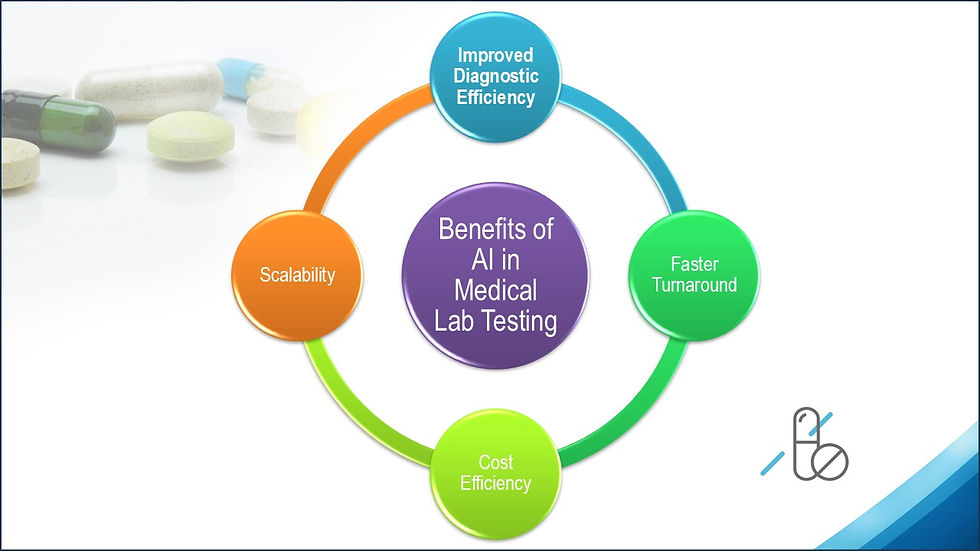Revolutionizing Medical Lab Testing: The Power of Artificial Intelligence
- Admin

- Sep 14
- 4 min read
Artificial Intelligence (AI) is transforming every industry and the same is the impact on the Healthcare Industry too. Healthcare industry is undergoing a transformative shift due to AI. Medical Lab Testing is getting reshaped due to AI by enhancing diagnostic accuracy and streamlining workflows. AI is improving patient outcomes, optimizing lab operations. This blog briefly explores the critical role of AI in medical laboratory testing, its benefits, challenges, and future potential.

What is AI in Medical Lab Testing?
In simple words, when Computer systems can perform tasks that require human intelligence, it is referred to as Artificial Intelligence (AI). In modern medical laboratories, processes such as sample analysis, diagnosis and result interpretation are automated and enhanced by leveraging machine learning algorithms, deep learning networks, and data analytics.
Unlike traditional lab testing, where human technicians manually analyse blood samples, tissue biopsies, or genetic data, AI-powered systems can analyse vast amounts of data rapidly and with high precision, reducing human error and improving efficiency.
Key Applications of AI in Medical Lab Testing

1. Automated Sample Analysis
Patterns in microscopic images, such as blood smears, histology slides or urine samples are major inputs for training AI systems. Deep learning using Convolutional neural networks (CNNs) is very effective in image-based diagnostics.
Example: AI algorithms can detect abnormal blood cells indicating leukaemia with high accuracy, often surpassing the diagnostic speed of human technicians.
2. Predictive Diagnostics
Apart from sample analysis, AI can also be used for predicting potential diseases by analysing trends in the patient’s lab results over a period of time.
Example: Machine learning models can detect early signs of chronic diseases such as diabetes or kidney failure.
3. Quality Control and Error Reduction
Lab equipment performance data can be continuously monitored by AI powered systems to detect anomalies. This helps in identifying calibration errors, inconsistent sample readings or any other defect in the equipment that may render results that is defective which can cause incorrect diagnosis.
Example: An AI system flags irregularities in spectrometry readings, prompting preventive maintenance or re-testing of the equipment before issuing patient results.
4. Streamlined Lab operations : Workflow Management
Lab operations can be streamlined by AI powered Workflow management using automated sample tracking. Automated workflow can help in prioritizing urgent cases based on predefined algorithms and schedule tests accordingly on priority.
Example: During high patient load periods, AI ensures that critical COVID-19 test samples are processed first without compromising accuracy.
Benefits of AI in Medical Lab Testing

✅ Improved Diagnostic Accuracy
Human subjectivity and biases are considerably reduced in complex data interpretation by using automation and AI. Results generated by AI is consistent and reproducible. As per the latest studies, it has been found that over 95% accuracy is achieved in detection of certain cancers and blood disorders.
✅ Faster Turnaround Time
Results are delivered faster with higher accuracy by using AI for automated sample analysis and optimized workflows. This is very crucial for time-sensitive diagnosis in case of infections or acute conditions.
✅ Cost Efficiency
Automation reduces wastage of reagents leading to lower operational costs in the long term.
✅ Scalability
Larger volume of tests can be handled using AI automation without proportionally increasing staff or equipment. This can really help in handling many more cases in case of large-scale health crises like pandemics.
Challenges and Considerations

⚠️Misuse of AI
AI Misuse is the biggest threat to human health and effective use of AI. It has been observed that patients use different tools like ChatGPT, Gemini, DeepSeek etcetera to analyse their disease without understanding the correlation of the symptoms. This can prove to be a biggest problem in patient cure, since AI can give incorrect diagnosis due to incorrect symptom data.
⚠️Data Privacy and Security
Handling sensitive patient data requires strict compliance with regulations such as HIPAA. Ensuring secure storage and processing of this data is essential.
⚠️ High Initial Investment
Implementing AI-powered lab systems involves significant upfront costs in hardware, software, and staff training. However, long-term benefits often justify the investment.
⚠️ Regulatory Approvals
AI algorithms in medical diagnostics require rigorous validation and regulatory approval to ensure safety and effectiveness, which can slow down adoption.
⚠️ Integration with Legacy Systems
Many medical labs operate on legacy systems. Integrating AI solutions into existing infrastructure without disrupting workflows can be challenging.
Future Outlook of AI in Medical Lab Testing

The future of AI in medical laboratories looks promising. Emerging trends include:
Explainable AI (XAI): Increasing demand for transparent AI models that explain their diagnostic decisions to build trust among healthcare professionals.
AI-Driven Personalized Medicine: Combining lab test data with patient genetic profiles for tailored treatment plans.
Remote and Point-of-Care Testing: Portable AI-powered diagnostic devices enabling testing outside traditional lab settings, improving accessibility in rural or resource-limited areas.
Example: Imagine a small clinic using an AI-powered blood analyser to provide instant test results without needing to send samples to a central lab.
Conclusion
Artificial Intelligence is revolutionizing medical lab testing by improving diagnostic accuracy, accelerating results, and reducing operational costs. While challenges such as data security and regulatory compliance exist, ongoing innovation is steadily overcoming these barriers. As AI technology advances, its role in medical laboratories will continue to expand, offering more personalized, efficient, and accessible healthcare solutions. However, patients should always remember that trained and expert advice is a must for successful use of AI.





Comments